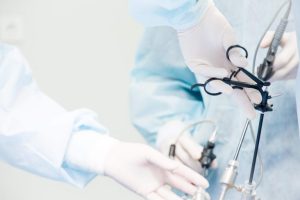Women's Health
How Are Abdominal Hernias Treated?

Abdominal hernias are one of the most common conditions to see a surgeon. Treatment for such abdominal hernias can only be through surgery.
What Is an Abdominal Hernia?
An abdominal hernia is a protrusion through an opening in the muscles of the abdomen.
There are different types of abdominal hernias depending on the location:
- At the site of a previous incision (incisional);
- Above the navel (epigastric); or
- Groin which can include inguinal or femoral hernias.
Why is Treatment of Abdominal Hernia Important?
An abdominal hernia can lead to serious complications if left untreated. An urgent emergency surgery will be required if your hernia is incarcerated or strangulated. An incarcerated hernia occurs when the projecting organ is unable to be pulled back into position in the body, whereas a strangulated hernia is when the protruding tissue’s blood supply is cut off. Both are medical emergencies.
The patient may experience vomiting from bowel obstruction or severe pain in the hernia or the abdomen from an incarcerated hernia or bowel strangulation. In the worst case, it may even lead to death due to the eventual necrosis and subsequent soiling from the strangulated tissue.
How are the treatment options for an Abdominal Hernia?
Physical examination of the abdomen is frequently used to make the diagnosis. An ultrasound or a CT scan may be used to confirm the diagnosis in cases that are less obvious. A CT scan or X-ray may be used to check for acute problems including intestinal obstruction or strangling.
Surgery is the only method available to repair an abdominal hernia. There are two forms of surgery to do so: open surgery or laparoscopic surgery. Dr Tan Chuan Chien will be able to advise you on the available options for treatment.
Open Surgery
In open surgery, the surgeon makes an incision near to the hernia’s location which forces the protruding tissue back into the abdomen during open surgery. The area is then sewed shut, sometimes using surgical mesh to reinforce it. Finally, closing the incision.
Laparoscopic Surgery

This type of surgery involves a small camera and miniature surgical instruments. It requires only a few minor incisions and is more gentle on the surrounding tissue.
It is important to know that laparoscopic surgery is not appropriate or beneficial for all hernias. The type of surgery you require depends on the condition of the hernia you suffer from.
Post Surgery Care for Abdominal Hernias
Elderly patients may require overnight observation for 1 to 2 days while younger patients may not require an overnight stay.
Speak to your doctor before you begin any light activities. When the wound is no longer painful, you can resume light activities such as brisk walking, climbing stairs, jogging, and cycling, gradually increasing the intensity as your physical condition permits.
Early in your rehabilitation, you may be recommended to avoid lifting heavy items or engaging in intense, physical activities.
You may also be given an abdominal binder to wear to help support your abdomen.
FAQs About Abdominal Hernia Treatment
What are the common symptoms of an Abdominal Hernia?
When the patient is standing or straining, the hernia may grow more visible or larger, and when the patient is resting down, the hernia may go away. Discomfort, a dragging sensation, or even pain are all possible symptoms. A hernia can get larger if it is not treated.
It is recommended to immediately see a medical professional if you experience the following symptoms:
- Sudden, severe abdominal pain
- Fever
- Vomiting
- Nausea
- Difficulty passing motion or wind
- The hernia becomes firm or tender or cannot be pushed back in
- Any lumps in the abdomen (even if not painful)
Who is at risk of Abdominal Hernia?
Patients with a genetic predisposition and are obese have a higher chance of being at risk of an abdominal hernia. It is recommended to go for scans if a hernia is suspected for early diagnosis and treatment.
Are there any alternatives to surgery to cure Abdominal Hernia?
There is currently no form of alternative treatment aside from surgery. Speak to your doctor to learn more about the treatment procedure.
WHO WE ARE
About SOG Health Pte. Ltd.
Established in 2011, SOG Health Pte. Ltd. (“SOG”) is a leading healthcare service provider dedicated to delivering holistic health and wellness services to the modern family.
With a long and established track record in Singapore providing Obstetrics and Gynaecology (“O&G”) services such as pre-pregnancy counselling, delivery, pregnancy and post-delivery care, the Group has since further expanded its spectrum of healthcare services to include Paediatrics, Dermatology, and Cancer-related General Surgery (Colorectal, Breast & Thyroid).
The Group’s clinics, under its four operating segments of O&G, Paediatrics, Oncology and Dermatology, are strategically located throughout Singapore to provide easy access to its patients.
- Obstetrics
- Gynaecology
- GynaeOncology
- Breast, Thyroid & General Surgery
- Colorectal, Endoscopy & General Surgery
- Dermatology
- Paediatrics
Consult With A Specialist From SOG
Visit one of our specialists today to learn more about your health!
Recommended Specialist
Book An Appointment
Fill up this form and our clinic will get back to you shortly.
For general enquiries, please click here.




